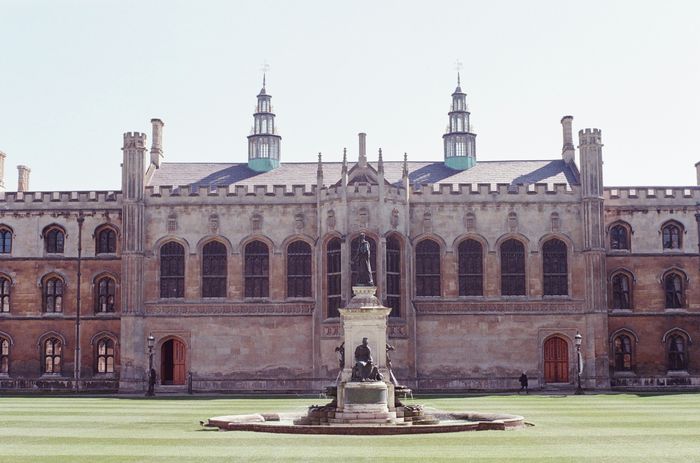Why is there not a theatre studies course at Oxbridge?
Kate Woodman interrogates the reasons behind the lack of a theatre degree at Oxford and Cambridge

Oxbridge is known for its vibrant theatre scene and the plethora of successful actors, creatives, and technicians amongst their alumni. Therefore, doesn’t it seem surprising that these powerhouse universities, which pride themselves on student theatrical excellence, do not have even one course dedicated to theatre studies?
As of 2024, the number of students taking drama GCSE had declined by 39.4% since 2010 and A-Level drama has seen a 5.8% decrease in subject uptake in the year from 2023 to 2024, with a 45% drop in entries in England between 2010 and 2023. These are telling figures, underlining the lack of respect for the creative subjects. With the devaluing of the arts in education, cuts in funding, and the instability of a career in theatre creating a negative and uncertain future, now is the time for Oxbridge, as institutions with worldwide reputations and global reach, to take a stand and make a difference to the dialogue by validating the importance of theatre studies.
“Now is the time for Oxbridge to take a stand and make a difference”
In 2021, Oxbridge staged over 300 productions, highlighting the sheer volume of talented student-led theatre and indicating interest and enthusiasm for academic scholarship in this field. This talent could be harnessed by creating a challenging course for those wanting to develop their passion for theatre in an academically rigorous environment. Although Cambridge’s Education Course provides some scope for theatrical study with, for example, the option of theatre-related papers in the second and third year, the course is clearly not designed to explore the complexities and nuances that a theatre studies course would provide. Even this limited theatre study is not celebrated, seemingly the opposite: the pathway previously offered on ‘Education, English, Drama, and the Arts’ has been changed for ‘Education, Literature, and the Arts,’ minimising the academic pursuit of theatre and drama, and also devaluing its academic value in the process.
Cambridge also prides itself on their degrees offering valuable career prospects with each course outlining future career possibilities, but again theatre studies has its place here. Has Oxbridge forgotten that the creative industries do offer valid career paths? They contributed £124 billion in gross value added to the UK economy in 2023 and accounted for 2.4 million jobs between 2023-24. Surely Oxbridge should be capitalising on the student interest and economic importance that such a degree encompasses?
“Has Oxbridge forgotten that the creative industries do offer valid career paths?”
Out of 22 Russell Group universities, ten offer at least one course with theatre or drama as a central component, demonstrating that theatre studies is a legitimate academic subject. It can foster creativity, communication, and leadership skills, as well as provide a firm academic footing to educate and inspire the next generation of creatives, administrators, and educationalists in our beleaguered arts industries. So, why is this ignored? Possibly it is not considered sufficiently academically rigorous, nor carrying the intellectual prestige of those subjects that have been consecrated into the canon of academic excellence, but surely these are outmoded views? It may not bring a centuries-old tradition of learning, but instead offers a means into the academic exploration and expression of personal, social and cultural history, and development that is increasingly important to a modern, global age.
Beyond the academic and creative, theatre studies has a unique relevance and role in impacting individuals and society. As Edward Bond has argued, theatre creates a space for actors and creatives to “recreate” reality and elicit tangible change. A current artistic work generating such a reshaping is the Netflix phenomenon show Adolescence. Although not theatre per se, this creative piece has impacted audiences across the globe, bringing the issues of misogyny and violence against women to the fore and eliciting a real change as some schools are now going to offer anti-misogyny lessons. If Oxbridge offered a course in theatre studies, students could not only study original and innovative artistic pieces but also learn to create and stage transformative works of their own. Creativity, communication, and change – how is this not relevant to our society, to our university?
The absence of a theatre studies course at Oxbridge feels like snobbery toward a non-traditional area of study, and this is arguably costing Oxbridge access to a brilliant sector of students. The wealth of student theatre attests to the depth of interest and talent, and if this upcoming theatrical talent could have the opportunity to pursue structured study at one of the most academically astute institutions in the world, just think of the positive impact they could make in the future. Our university should cultivate this creativity; it seems foolish to refuse to offer such a course because of outdated academic perceptions. Oxbridge should no longer be complicit in the downfall of the arts.
Want to share your thoughts on this article? Send us a letter to letters@varsity.co.uk or by using this form.
 News / Judge Business School advisor resigns over Epstein and Andrew links18 February 2026
News / Judge Business School advisor resigns over Epstein and Andrew links18 February 2026 News / Gov grants £36m to Cambridge supercomputer17 February 2026
News / Gov grants £36m to Cambridge supercomputer17 February 2026 News / Union speakers condemn ‘hateful’ Katie Hopkins speech14 February 2026
News / Union speakers condemn ‘hateful’ Katie Hopkins speech14 February 2026 News / CUCA members attend Reform rally in London20 February 2026
News / CUCA members attend Reform rally in London20 February 2026 News / Right-wing billionaire Peter Thiel gives ‘antichrist’ lecture in Cambridge6 February 2026
News / Right-wing billionaire Peter Thiel gives ‘antichrist’ lecture in Cambridge6 February 2026










